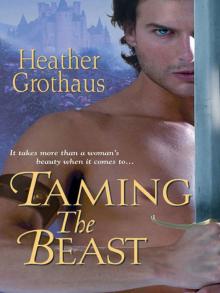- Home
- Heather Grothaus
Valentine Page 2
Valentine Read online
Page 2
“Please,” the giant entreated. “The men I seek are of great importance to King Baldwin, and you will be remembered kindly to him if you help me.”
“My friend, the only men who survived the march are well known to be the traitors of Chastellet. It is likely that anyone I managed to free would only slit your throat in thanks.”
There was no response from the blond beast, and the sack seemed to be burning the palm of Valentine’s hand.
It couldn’t hurt to look. It was likely only smelting scraps any matter.
He drew the sack back to himself with another sigh and loosened the neck to look inside. His eyes widened.
Coins. Gold coins.
Valentine looked back into the giant’s face, and as if the man saw the question Valentine was too shocked to ask, he supplied the answer.
“Chastellet’s wages. I am—was—the master stonemason here.” He held out his good arm to indicate the bailey. “I built this place. And now all my laborers are dead. Except you.”
“I am no laborer,” Valentine said as he looked back down into the sack. It was a fortune in gold—a year’s wages for ten men, at least. If, as the giant promised, the other sack contained an even greater wealth, Valentine could travel anywhere in the world he chose, in the greatest comfort.
Valentine looked up at the colossus again, his mind turning. “What if they are already dead? Then I would place myself in great danger for nothing.”
“I still pay you.”
“Mm-hmm.” He pursed his lips, staring at the man. “What if they are no already dead, but they are the traitors?”
“They aren’t. But still, I will pay you what I promise.”
“Even if dead, even if traitors?”
“Yes.”
Valentine crossed his arms. “They are soldiers?”
He shook his head. “A general, and a man of learning.”
Valentine frowned. “Franks?”
“English.”
“Well, I suppose that is something,” Valentine muttered. He straightened. “All right. Give me the other sack and I will think about it.”
“No. When you return with my friends, I will give you your payment.”
It had been worth a try.
“I could very well lose my own life in this business, you understand?”
“All the more reason to keep the remainder of the coin with me.”
So he was not as dim-witted as his appearance would lead one to believe. Before Valentine could comment further, the giant spoke again.
“You know the pagan language, and your coloring is akin to theirs. But if you feel you cannot succeed, only take me to Damascus and leave me at the gates. I will do it myself.”
“What would I get in return for that?”
“Ten pieces.”
“Ten pieces?” Valentine laughed. “There is a fortune in those bags, my friend!”
“Which can be yours in exchange for one simple task.” The man paused. “I would have no way of knowing if you somehow managed to make your way into the prison without the bribe. . . .”
Valentine stilled as the man’s meaning fell upon him: he could keep both sacks of coin.
He looked up at the purpling sky. It would be full dark in an hour. If he was sly, if he utilized all of his tricks, all of his charm, in twelve hours he could be away from Damascus again, this time as wealthy as a prince.
“You can no accompany me into the city,” Valentine began, tying the neck of the sack to one of the belts in his voluminous robes. “There are some caves in a nearby hillside that face the gates. You will wait for me there.”
“Very well.”
“And that is if we can even lay hand to my mount—surely he has run all the way to Tiberias by now, and I will no attempt this madness after the sun has risen.” Valentine turned and began walking once more toward the gaping entrance. “If I can no find my horse, you will pay me his full value, and for the worth of my supplies, which he carries.”
The giant followed along. “Of course.”
“If we are approached on the road by Saladin’s men, they may no be as accommodating as I,” Valentine warned.
“I will kill them all myself.”
Valentine threw back his head and laughed as he came to a stop and turned. “No in your condition, my friend.” He held out his hand. “Fine. We have a deal. I am Valentine Alesander.”
“Roman Berg.”
They shook hands, and then Valentine unlooped one of the long belts from his middle. “Kneel down and loose your feathered friend, Roman Berg. I will fix your shoulder for you. It does no appear to me that your arm is broken after all.”
Roman hesitated.
“Come now, you could kill me by falling on me. I have nothing more ominous in my hand than a little strip of leather.” Valentine waited.
At last the giant knelt in the dirt, setting his bag of coin and rough pack aside and gently lifting the fiercely colored hunting bird from his shoulder.
“Lou,” the man mumbled.
Valentine leaned slightly forward. “Pardon?”
“The falcon. I named him Lou. I don’t know what he was called before.”
“I see. Well, the pleasure is mine, Lou.” Valentine looped the ends of the strap around both palms several times, leaving a long length dangling between his fists. He captured Roman with the snare, drawing the strap tight under the deflated bulge of the man’s left bicep and pulling the giant’s right side flush against Valentine’s own braced thigh and hip.
“Now, Roman, are we agreed that once this little business is over, we shall part ways? No further conditions once I’ve given you what you ask for? No demands for me to carry you back to the land of sea monsters and longboats before I am paid?”
The man glared up—only slightly up—into Valentine’s face. “I keep my vows. What further use have I for a sneaking Spaniard? If I never see your swarthy face again, it shall be too soon.”
Chapter 1
May 1180
Beckham Hall
Kent, England
Lady Mary Beckham took a deep breath of the fresh, warm air and rested her chin in her hands as she adjusted her elbows on the stone windowsill. The view of the village in spring always made her smile as she watched the people scurrying about below, small as birds when seen from the third floor of the keep. Occasionally Mary would see people she knew by name, but they never took notice of her—she might as well have been a tapestry hanging on the side of the castle, a woman in a window rendered in embroidery.
It was the many persons she didn’t know whom she most loved to watch. She could give them her own pet names: Woolhead and Limpy Hip and Lady of Sausage. And she could create her own stories of their lives and personalities based on the small details she noticed from her observation point, high above the ground. Sometimes she had to watch for days to see some of her characters, but that suited Mary well enough. She had nothing else to do.
But her game had become more difficult the past several months, as the increase in Crusaders and pilgrims arriving and departing from the port of Beckhamshire caused temporary surges in the population of the town below. Mary would watch an individual for perhaps a fortnight, deciding on a name, a background, and then suddenly, with the ship departing to somewhere beyond the horizon, her character was gone and her story was dashed. This was particularly vexing with the soldiers, as they seemed to come and go from so many different lands, calling out with strange accents and wearing even stranger clothing.
Most vexing of all was that the majority of the fighting men would await their voyages in the lower levels of Beckham Hall, beneath Mary’s very feet, and yet she would never set eyes upon them while they were within her home.
“Well?” Agnes asked, her ever-present smile obvious in her voice. “Who’s out adventuring this eve?”
Mary glanced over her shoulder at her nurse, who was indeed smiling indulgently as she folded some freshly laundered linen at the table where Mary had taken her supper not
even an hour before. Although Mary was a score and six years, Agnes still maintained her insistence that Lady Mary dine early, as she had since she was a child. Mary didn’t mind. After all, it left more time before bed to watch the comings and goings below as the soldiers attended to their duties.
“Yes, let’s see then,” Mary said, turning her attention back to the view below and scanning the milling crowd. “Grandfather Crumb has just come across the green, and he is brandishing some sort of pastry. A treat for a sweetheart, perhaps.”
“Likely a stale trencher to chuck at some lad who dares cross before him, I suspect,” Agnes chortled.
“Oh, no, I can’t believe that. He looks so kind—he’s always smiling.”
“He’s a curmudgeon. It’s a grimace.”
“Whose adventure is this any matter?”
Agnes laughed. “What of Lady of Sausage? It should be nigh hour for her to pack up her wares.”
“I’ve not seen her,” Mary admitted, scanning the villagers for the portly old woman and her long stick full of swinging meats. “Oh! But there’s Princess Lard.”
“Her mother must’ve already come through, then. Who’s the lucky prince today?”
“I can’t tell exactly, bent over the way he is. Perhaps the Merman.”
“For goodness, Lady Mary—likening that warty scavenger to a fantasy creature.”
“Princess Lard cannot resist his siren’s call,” Mary teased. “Perhaps he’s brung her a magic seashell.”
“More likely a penny,” Agnes muttered.
Mary grinned to herself and sighed again. Birds sang, and the air was sweet, indeed. Beckham Hall’s upper two floors—where Mary had lived her entire life—were as lonely as ever, but she smiled because they would not be lonely for very much longer.
Besides Agnes and a handful of servants, the official Lady of Beckham Hall had no friends, no family, and no companions of any sort. Hadn’t since she was a baby and her parents had been lost at sea. Mary’s father had been the warden of the Cinque Ports of England, governing the ingress and egress of ships for England’s southern shores and providing a substantial navy for the king. Upon his death, Beckham Hall—and Lady Mary’s guardianship—had fallen to the Crown and been held in that manner until a suitable replacement could be found for her father.
Lady Mary suspected that the king had used the lengthy search for a new warden as merely an excuse to more closely monitor the wealth going in and out of the town, and to use Beckham Hall for his own purposes; it was largely a garrison and storehouse for the endless river of fighting men. Her presence had been but an aside, and Mary assumed the king had quite forgotten about her existence until just before last Christmastime, when a ship of returning Crusaders had landed in the town and been forced to take shelter at Beckham Hall by a sudden and unusual ice storm.
That’s when she had met him—her future husband, her betrothed. He’d come up the stairs from the main floor—a passage that was usually barred from the inside to protect Lady Mary from the irascible ilk of the soldiers below—seeming intent on exploring the whole of the castle. He’d been quite shocked to find Mary before the hearth in her small private hall, tending to her handwork, and her heartbeat had increased at the sight of him. He’d worn a studded, dark leather hauberk with a cross burned into the hide, his weapon still on his hip, his flowing red hair cascading in waves from his high forehead.
“A thousand pardons, my lady,” he’d gasped with a low bow, and Mary’s heart had trilled in her chest. “I was unaware this floor was occupied. I shall leave you posthaste.”
“No,” she’d called, her voice shaking with fear and excitement. She’d glanced over her shoulder to the stairs, which led to the uppermost floor and Agnes’s sleeping chamber. “Please stay, if you’d care for company. I know I would.”
They had talked the moon into bed that night, and Mary had only crawled beneath her own covers when the sun sparkled through her icy window and Agnes had come in bearing the breakfast tray. For the next several days, they kept the same routine—Mary would unbar the door after Agnes was abed, and she and her brave knight would talk away the hours, speaking of her lonely childhood and deceased parents, of Beckham Hall and the surrounding village, and of his heroic escapades in the Holy Land. He even carried a fantastically embroidered coin purse hidden in an ingenious flap in his leather tunic, heavy with coin.
His company had departed within the week, and it was with bitter tears that Mary had watched her soldier go, waving at him from her window high above. Only after he was gone and Agnes would not ignore the heartbroken sobs of her ward did Mary confess her late-night activities. The nurse had been scandalized and outraged and questioned Mary mercilessly after her honor, but Mary answered honestly that her virtue was still intact, for not even a kiss had her lost hero bestowed upon her.
If she had been morose during all the lonely years of her residence at Beckham Hall, Mary soon became despondent. She didn’t look out her window. She’d lost all imagination for her game.
But then, on the first day of the new year, when Mary was sitting before her hearth alone, there came a rapping at the door to the lower floors. It was just past midnight. Hoping against hope, Mary had once more disregarded Agnes’s primary rule and dashed down the stairs to struggle with the bar. She flung open the door to find—
A strange soldier, dusted with his road travels and a light sprinkle of snow.
“Message from the Crown for Lady Mary Beckham,” the soldier had stated, thrusting a folded and sealed parchment at Mary.
She took it and secured the door once more before flying up the stairs to her chair before the hearth. Pulling the wax away with trembling fingers, she’d opened the message and read, her heart pounding in her chest.
Then she’d looked up from the royal decree and given a shout of laughter. The king had found his man, and apparently so had Mary, for she was to be wed that very year to her knight in burnished leather.
“You’d better come away now and prepare for your lessons with Father,” Agnes called, stirring Mary from her delightful reverie. Mary turned and regarded the nurse as she lifted her willow basket onto her substantial hip. “I’ll come back in an hour with your pudding and warm milk.”
“Yes, Agnes,” Mary said. And as she did as her nurse asked, Mary thought happily that the woman would soon find new purpose in caring for Mary’s own children, which would surely number more than the fingers on both her hands.
Perhaps her toes as well.
Mary was waiting in the tiny chapel tucked in a corner of the same floor as her private hall when Father Braund rushed in through the arched stone doorway. He gripped his leather-bound book in both hands and, after looking around at the hall behind him frantically, began to push the rounded wooden door closed. He apparently did not trust his eyes, for he opened the door again, leaned out, his head swiveling in either direction, and then shut the door firmly. He seemed to scan the closed door, as if looking for something.
Mary smiled at the usually calm priest’s odd behavior, and then her eyebrows rose as he seized the back of a plain wooden chair nearby and wedged it against the door, its back legs dropped securely into a gap in the wooden floorboards.
He’d been searching for a lock. But of course a private chapel would have no need for such secrecy, and Mary wondered why Beckham Hall’s priest suddenly did.
He spun around to face her at last, his flap of graying blond hair rising like a sail over his pate; and his eyes seemed to examine the very corners of the chapel, which was no more than twenty feet squared.
“Good evening, Father Braund,” Mary began. “Is something amiss?”
“Where is your nurse?” he whispered, his gaze flitting about the chamber.
“Well, I don’t know exactly,” Mary said, nonplussed.
“She isn’t here, is she?” the priest pressed, bending at the waist and peering beneath the benches as if he expected the portly woman to spring forth, shouting “Ah-ha!”
&nbs
p; “No,” Mary said, half-laughing. “I don’t expect her until our hour is complete. She is insistent that I fully comply with my instruction before becoming a married woman, and I would wager she would rather spill a chamber pot across the floor than interrupt our lessons.”
The young priest shook his head, his flap of hair flopping, his eyes wide. Mary noticed he was gripping his leather book to his chest, as if clinging to the true cross itself. “No more lessons,” he said. “I’ve information of a much graver nature to impart to you this eve.”
Mary brightened. “I’ve completed all the lessons already?”
Again he shook his head, and his brows knit together in a pained expression. “You may not get the chance to put them into practice.”
The first inklings of concern tickled at the nape of Mary’s neck. “What do you mean?”
Father Braund swallowed and his eyes flicked down to the book in his hand. “Come,” he said at last, scurrying to a tall, shallow side table against one of the walls. He set down his book as Mary appeared at his side.
“As you know, I must compile a document of your birth and lineage, and that of your parents’, to be recorded in preparation for your marriage. Because your betrothed would gain not only your hand and Beckham Hall but also a noble position within the king’s court, it is imperative that records of your pedigree be complete, for they shall be thoroughly examined by the king’s advisers before your wedding takes place in the autumn.”
“Yes,” Mary said, “but I don’t see how that could possibly give you cause for such alarm. My father’s lineage is well documented here, where he and his predecessors were born for hundreds of years. And my mother’s family is well known as one most loyal, even as long ago as to William. I was their only child, of that there can be no question.”
“No, no—no questioning any of that at all,” the priest agreed, still speaking in a raspy voice, as if he feared they would be overheard through the thick stone walls. “It’s what was recorded after your birth that is so troubling.”
Mary frowned. “After my birth?”

 The Highlander's Promise
The Highlander's Promise The Laird's Vow
The Laird's Vow The Scot's Oath
The Scot's Oath Taming The Beast
Taming The Beast Never Seduce A Scoundrel
Never Seduce A Scoundrel Roman
Roman Never Love a Lord
Never Love a Lord Never Love a Lord (Foxe Sisters)
Never Love a Lord (Foxe Sisters) Valentine
Valentine Adrian
Adrian Constantine
Constantine Never Kiss A Stranger
Never Kiss A Stranger